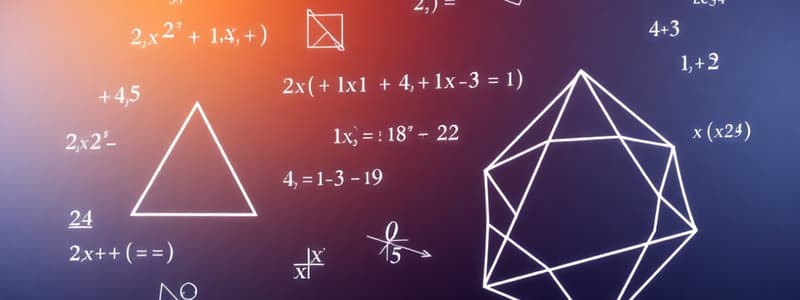Podcast
Questions and Answers
Which property states that changing the order of numbers in an addition or multiplication operation does not change the result?
Which property states that changing the order of numbers in an addition or multiplication operation does not change the result?
- Distributive property
- Identitative property
- Commutative property (correct)
- Associative property
What is a function?
What is a function?
- An equation with one variable
- A combination of numbers and symbols
- A statement that two expressions are equal
- A relation between a set of inputs and outputs (correct)
Which theorem can be used to calculate the length of a side in a right triangle?
Which theorem can be used to calculate the length of a side in a right triangle?
- Law of sines
- Quadratic formula
- Triangle inequality theorem
- Pythagorean theorem (correct)
In calculus, what does differentiation primarily measure?
In calculus, what does differentiation primarily measure?
What is the purpose of statistical hypothesis testing?
What is the purpose of statistical hypothesis testing?
Which of the following is not a type of number in number systems?
Which of the following is not a type of number in number systems?
What is a common application of discrete mathematics?
What is a common application of discrete mathematics?
What do the addition and multiplication rules in probability help determine?
What do the addition and multiplication rules in probability help determine?
What does integration in calculus primarily compute?
What does integration in calculus primarily compute?
Which of the following best describes combinatorics?
Which of the following best describes combinatorics?
Flashcards are hidden until you start studying
Study Notes
Key Areas of Mathematics
-
Arithmetic
- Basic operations: addition, subtraction, multiplication, division.
- Properties: commutative, associative, distributive.
- Order of operations: PEMDAS (Parentheses, Exponents, Multiplication and Division, Addition and Subtraction).
-
Algebra
- Variables: symbols representing numbers.
- Expressions: combinations of numbers and variables.
- Equations: statements that two expressions are equal.
- Functions: relations between a set of inputs and outputs.
-
Geometry
- Shapes: points, lines, angles, polygons, circles.
- Area and perimeter calculations for various shapes.
- Theorems: Pythagorean theorem, properties of triangles and circles.
-
Trigonometry
- Relationship between angles and sides of triangles.
- Functions: sine, cosine, tangent (and their inverses).
- Applications: solving triangles, modeling periodic phenomena.
-
Calculus
- Differentiation: rate of change, slopes of curves.
- Integration: area under curves, accumulation of quantities.
- Fundamental Theorem of Calculus: links differentiation and integration.
-
Statistics
- Data collection methods: surveys, experiments.
- Descriptive statistics: mean, median, mode, range, variance.
- Inferential statistics: hypothesis testing, confidence intervals.
-
Probability
- Basic concepts: outcomes, events, sample space.
- Probability rules: addition and multiplication rules.
- Distributions: normal, binomial, Poisson, etc.
-
Discrete Mathematics
- Study of countable, distinct structures.
- Topics: combinatorics, graph theory, algorithms.
- Applications in computer science and cryptography.
Important Mathematical Concepts
-
Number Systems
- Natural numbers, whole numbers, integers, rational numbers, irrational numbers, real numbers, complex numbers.
-
Mathematical Proofs
- Techniques: direct proof, proof by contradiction, induction.
-
Mathematical Modeling
- Creating representations of real-world situations using mathematical concepts.
Applications of Mathematics
- Real-world applications: engineering, physics, economics, data science.
- Critical thinking and problem-solving: develops analytical skills applicable across various fields.
Key Areas of Mathematics
-
Arithmetic: Fundamental operations are addition, subtraction, multiplication, and division. Familiarize with properties such as commutative, associative, and distributive. Master the order of operations using PEMDAS.
-
Algebra: Utilizes variables to represent unknown values. Incorporates expressions formed from numbers and variables, and equates them in equations. Functions illustrate the relationship between sets of inputs and corresponding outputs.
-
Geometry: Encompasses various shapes including points, lines, angles, polygons, and circles. Important calculations involve determining area and perimeter. Notable theorems include the Pythagorean theorem and properties of triangles and circles.
-
Trigonometry: Examines relationships between angles and sides of triangles. Key functions are sine, cosine, and tangent, along with their inverses. Applications focus on solving triangles and modeling periodic phenomena.
-
Calculus: Involves differentiation for determining rates of change and slopes of curves. Integration focuses on calculating the area under curves and accumulating quantities. The Fundamental Theorem of Calculus bridges differentiation and integration concepts.
-
Statistics: Covers methods for data collection, including surveys and experiments. Descriptive statistics provide tools like mean, median, mode, range, and variance to summarize data. Inferential statistics involve hypothesis testing and confidence intervals to draw conclusions from data samples.
-
Probability: Introduces essential concepts like outcomes, events, and sample spaces. Key probability rules include addition and multiplication. Various distributions such as normal, binomial, and Poisson are critical for understanding different probabilistic scenarios.
-
Discrete Mathematics: Focuses on countable structures such as integers and graphs. Important topics include combinatorics, graph theory, and algorithms. This area has notable applications in computer science and cryptography.
Important Mathematical Concepts
-
Number Systems: Includes various types such as natural numbers, whole numbers, integers, rational numbers, irrational numbers, real numbers, and complex numbers, providing a foundation for mathematical operations.
-
Mathematical Proofs: Essential techniques include direct proof, proof by contradiction, and induction, which are necessary for validating mathematical statements.
-
Mathematical Modeling: Involves creating abstract representations of real-world scenarios using mathematical language and concepts, aiding in problem-solving and analysis.
Applications of Mathematics
-
Real-world applications: Mathematics finds use in engineering, physics, economics, and data science, illustrating its versatility and necessity in practical scenarios.
-
Critical thinking and problem-solving: The study of mathematics enhances analytical skills, fostering critical thinking applicable across various professional fields.
Studying That Suits You
Use AI to generate personalized quizzes and flashcards to suit your learning preferences.



